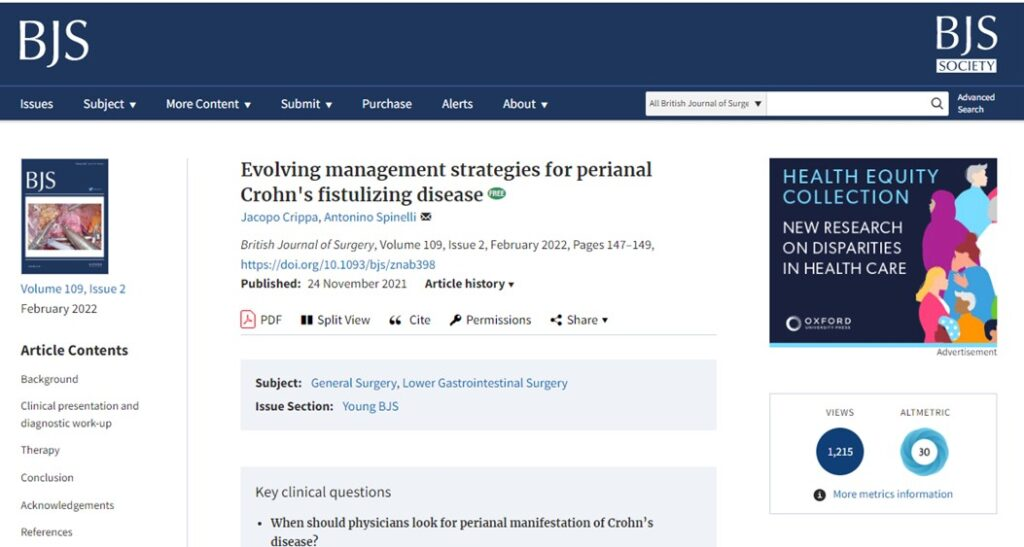BJS Academy>Young BJS>Something interestin...
Something interesting I learnt in the operating room…a deliberate twist of fate.
Enoch Toluwani Owolabi; 5th year Medical Student; Obafemi Awolowo University Teaching Hospital Complex; Ile-Ife, Osun State; Nigeria; Twitter: @OwolabiEnoch1
24 August 2023
General
Related articles

Evolving management strategies for perianal Crohn’s fistulizing disease
Jacopo Crippa, Antonino Spinelli British Journal of Surgery, Volume 109, Issue 2, February 2022, Pages 147–149 Comment: the authors recommend integrating medical and surgical management.

My night on-call in Sweden
Hans Lederhuber ha.lederhuber@mailbox.org, @HansL16
As a very junior surgical registrar I took care of a fairly young patient with metastatic prostate cancer for palliation. He was referred to hospital by the community palliative team at regular intervals for scaling up his palliative treatment. He was one of those patients who has been in hospital so much that they know the ward better than some of the junior doctors. As ward registrar, I had established a friendly doctor-patient relationship with him and checked on him whenever time allowed. This particular night, as so many night shifts before, I wandered down the dimmed ward corridors to check with the nurses that all patients were settled. I knocked on my patient’s single room door and he lay there, listening to his favourite tunes. His face oedematous and pale, but he always smiled at me. He knew his time was running out but he told me still about future plans he and his partner had: a weekend trip, as soon as he could leave hospital. We talked a bit about travelling until I was bleeped by ED to check on a patient. I told the patient goodbye and was about to leave the room. He called me back, took my hand and pressed it firmly. Thank you, he whispered, looking at me intensely. I’ll pop back in in the morning, before I head home, I promised. The next morning, the nurse on the ward asked me to fill in the death certificate for a patient who had died during the night. There was a valid DNR-form on the chart and the night team had not seen any point in disturbing me in my work with the not-unexpected death of a palliative cancer patient. He was not the last patient I told a “see you tomorrow” that never happened, but he was my first. While I do not remember every palliative patient who died during my night shift, this very first patient is burned deep into my memory. Comment:Coming to terms with caring for the dying patient.

My Night on Call…The Human Touch
Gianluca Pellino, BJS Academy SoMe and Associate Professor of Surgery at University of Campania, Naples, Italy, @GianlucaPellino
During my surgical training, I visited the UK, and was on call as a Senior House Officer. Having trained in Italy (and in the south), I used to create a connection with patients, which included some sort of physical contact, e.g., offering handshaking or placing a hand on the shoulder. During one of my first outpatient clinics in UK, I introduced myself to a new patient, and invited them to sit while conducting the interview and I put my hand on their shoulder. The consultation went on without any issues (that was my feeling); however, at the end of the clinic, my responsible consultant asked me to have a quick chat. We had a coffee together, and I was told that the patient reported that my unnecessary touching had been an unpleasant experience which made them feel uncomfortable. I felt bad; the consultant smiled and reassured me that it was not a big deal, but I only had to learn to adapt to different ways of working and get used to different cultures. Some weeks later, I was on a night shift covering surgical wards. During a ward-round in the evening, I saw an elderly gentleman. who had had one of his legs amputated. During the consultation, I felt he was feeling uncomfortable with a strange doctor not from his surgical team assessing him. I had a brief chat with him and afterwards offered my hand. After some hesitation, he shook my hand. The following night, I visited him again, he seemed more relaxed and we had another brief but pleasant conversation; this also happened on the following two nights.
Copied!
Connect

Copyright © 2026 River Valley Technologies Limited. All rights reserved.








.jpg)



